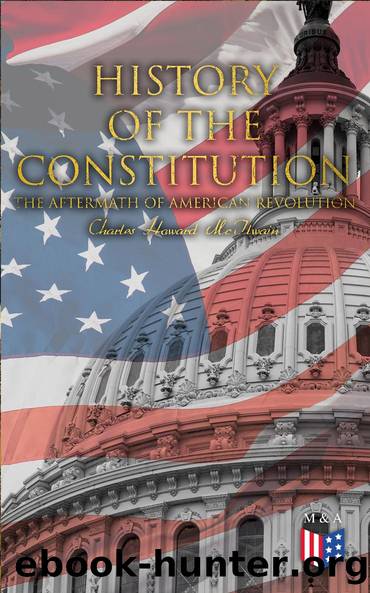History of the Constitution: The Aftermath of American Revolution by Charles Howard McIlwain

Author:Charles Howard McIlwain [McIlwain, Charles Howard]
Language: eng
Format: epub
Tags: Nonfiction, History, Americas, United States, Revolutionary Period (1775-1800), 19th Century
ISBN: 4064066383268
Publisher: Madison & Adams Press
Published: 2021-04-01T04:00:00+00:00
NOTE TO CHAPTER II
It is no part of my purpose to review the large and important contemporary American literature on the constitutional issues. It has been done more than once. The best bibliography of it remains the note of Justin Winsor in Narrative and Critical History of America, Vol. VI, pp. 68-112. Possibly the fullest contemporary discussions of the particular point taken up in this chapterâthe constitutional relation of realm and dominionsâis found in Daniel Leonardâs papers, originally contributed to the Massachusetts Gazette and Post-Boy, over the name of Massachusettensis in 1774-5, and later published at Boston in collected form; together with the answers of John Adams writing as Novanglus, collected in his Works, edited by Charles Francis Adams, Boston, 1851, Vol. IV, pp. 1-177. See especially, Massachusettensis (Boston, 1775), pp. 41-42, 42-43, 45-46, 47, 51-52, 76 and 78. The authorâs fundamental argument was that âwhen a nation takes possession of a distant country, and settles there, that country though separated from the principal establishment or mother country, naturally becomes a part of the stateâ (p. 41). All the rest follows from this. âWe are a part of the British empire are not aliens but natural-born subjects; and as such bound to obey the supreme power of the state, and entitled to protection from itâ (p. 52). âUpon this point, whether the colonies are distinct states or not, our patriots have rashly tendered Great Britain an issue, against every principle of law and constitution, against reason and common prudenceâ (p. 76). John Adamsâs answer is the most elaborate exposition extant of the American interpretation of the constitutional problem of the empire, for which no summary or selection of extracts should be taken in lieu of the entire original. See especially, pp. 37, 38 99-100, 105-106, 113, 114, 122, 123-125, 127, 133, 142-146, 151, 157-159, 162-163, 165, 169-172, 174, 176-177. At the end he sums up his conclusions as follows, with immediate reference to the grant of the Charter of Massachusetts Bay by Charles I and the inferences of Massachusettensis upon it: âBut his acting as king of England ânecessarily supposes the territory granted to be a part of the English dominions, and holden of the crown of England.â Here is the word âdominionsâ systematically introduced instead of the word ârealm.â There was no English dominions but the realm. And I say, that America was not any part of the English realm or dominions. And therefore, when the king granted it, he could not act as king of England, by the laws of England. As to the âterritory being holden of the crown, there is no such thing in nature or art.' Lands are holden according to the original notices of feuds, of the natural person of the lord. Holding lands in feudal language, means no more that the relation between lord and tenant. The reciprocal duties of these are all personal. Homage, fealty &c. and all other services, are personal to the lord; protection, &c. is personal to the tenant.
Download
This site does not store any files on its server. We only index and link to content provided by other sites. Please contact the content providers to delete copyright contents if any and email us, we'll remove relevant links or contents immediately.
| Americas | African Americans |
| Civil War | Colonial Period |
| Immigrants | Revolution & Founding |
| State & Local |
In Cold Blood by Truman Capote(3375)
The Innovators: How a Group of Hackers, Geniuses, and Geeks Created the Digital Revolution by Walter Isaacson(3162)
Steve Jobs by Walter Isaacson(2889)
All the President's Men by Carl Bernstein & Bob Woodward(2369)
Lonely Planet New York City by Lonely Planet(2218)
And the Band Played On by Randy Shilts(2198)
The Room Where It Happened by John Bolton;(2152)
The Poisoner's Handbook by Deborah Blum(2135)
The Innovators by Walter Isaacson(2098)
The Murder of Marilyn Monroe by Jay Margolis(2095)
Lincoln by David Herbert Donald(1983)
A Colony in a Nation by Chris Hayes(1927)
Being George Washington by Beck Glenn(1923)
Under the Banner of Heaven: A Story of Violent Faith by Jon Krakauer(1790)
Amelia Earhart by Doris L. Rich(1691)
The Unsettlers by Mark Sundeen(1682)
Dirt by Bill Buford(1671)
Birdmen by Lawrence Goldstone(1662)
Zeitoun by Dave Eggers(1643)
